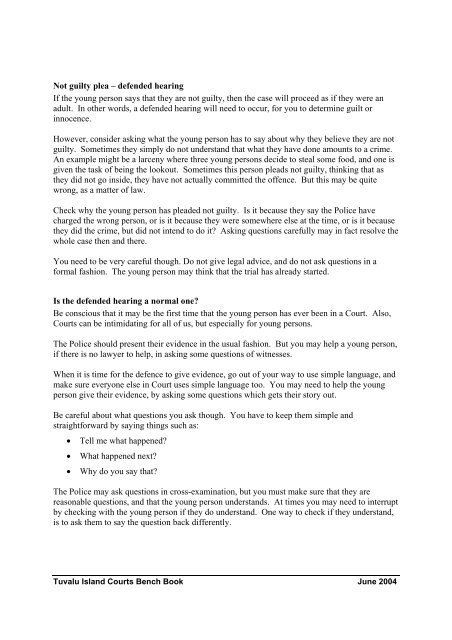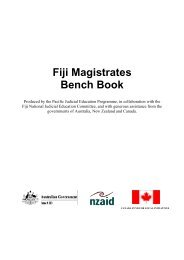Tuvalu Island Courts Bench Book - Federal Court of Australia
Tuvalu Island Courts Bench Book - Federal Court of Australia
Tuvalu Island Courts Bench Book - Federal Court of Australia
You also want an ePaper? Increase the reach of your titles
YUMPU automatically turns print PDFs into web optimized ePapers that Google loves.
Not guilty plea – defended hearing<br />
If the young person says that they are not guilty, then the case will proceed as if they were an<br />
adult. In other words, a defended hearing will need to occur, for you to determine guilt or<br />
innocence.<br />
However, consider asking what the young person has to say about why they believe they are not<br />
guilty. Sometimes they simply do not understand that what they have done amounts to a crime.<br />
An example might be a larceny where three young persons decide to steal some food, and one is<br />
given the task <strong>of</strong> being the lookout. Sometimes this person pleads not guilty, thinking that as<br />
they did not go inside, they have not actually committed the <strong>of</strong>fence. But this may be quite<br />
wrong, as a matter <strong>of</strong> law.<br />
Check why the young person has pleaded not guilty. Is it because they say the Police have<br />
charged the wrong person, or is it because they were somewhere else at the time, or is it because<br />
they did the crime, but did not intend to do it? Asking questions carefully may in fact resolve the<br />
whole case then and there.<br />
You need to be very careful though. Do not give legal advice, and do not ask questions in a<br />
formal fashion. The young person may think that the trial has already started.<br />
Is the defended hearing a normal one?<br />
Be conscious that it may be the first time that the young person has ever been in a <strong>Court</strong>. Also,<br />
<strong><strong>Court</strong>s</strong> can be intimidating for all <strong>of</strong> us, but especially for young persons.<br />
The Police should present their evidence in the usual fashion. But you may help a young person,<br />
if there is no lawyer to help, in asking some questions <strong>of</strong> witnesses.<br />
When it is time for the defence to give evidence, go out <strong>of</strong> your way to use simple language, and<br />
make sure everyone else in <strong>Court</strong> uses simple language too. You may need to help the young<br />
person give their evidence, by asking some questions which gets their story out.<br />
Be careful about what questions you ask though. You have to keep them simple and<br />
straightforward by saying things such as:<br />
• Tell me what happened?<br />
• What happened next?<br />
• Why do you say that?<br />
The Police may ask questions in cross-examination, but you must make sure that they are<br />
reasonable questions, and that the young person understands. At times you may need to interrupt<br />
by checking with the young person if they do understand. One way to check if they understand,<br />
is to ask them to say the question back differently.<br />
<strong>Tuvalu</strong> <strong>Island</strong> <strong><strong>Court</strong>s</strong> <strong>Bench</strong> <strong>Book</strong> June 2004
















